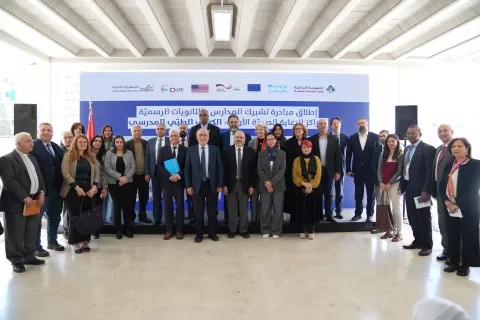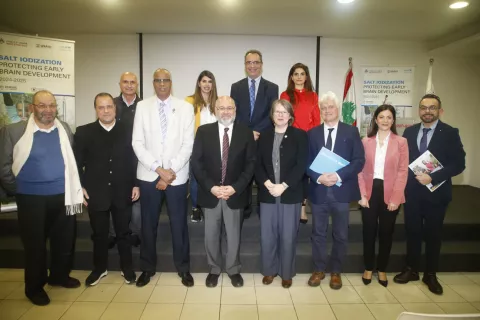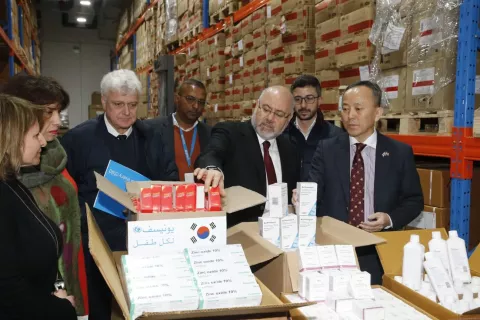Ministry of Public Health, in partnership with UNICEF, invests in solar solutions to scale up healthcare results for children and communities across Lebanon.

- Available in:
- English
- العربية
Beirut 19 March 2024 – In response to the extensive economic and fuel crisis impacting Lebanon, UNICEF prioritized a significant investment in solar solutions to sustain healthcare services for children and communities throughout the country. The ongoing crisis has profoundly affected daily life, exacerbating challenges within the public health system, particularly in delivering essential primary health services.
As part of a comprehensive strategy to support Lebanon's public health system, UNICEF, in collaboration with partners such as UNDP and WHO, is actively supporting the Ministry of Public Health in various solarization initiatives.
Minister of Public Health, Dr. Firas Al-Abyad, said: “We thank UNICEF for providing support to this project as it constitutes an environmental and sustainable solution, and highlights the necessity of supporting public institutions so that they carry out their duty and provide the needed services especially in the difficult circumstances that Lebanon is witnessing.” He added: "The situation will not change by waving a magic wand, but we can build on achievements and steps we make towards the development our country that we are responsible of. With our partners’ support, we can achieve our goals."
Since 2023, UNICEF's commitment to sustainable energy solutions has led to the solarization of over 182 Primary Health Care Centers (PHCCs), 14 Qadaa offices, and the central vaccine warehouse. Additionally, 23 dispensaries and other facilities are currently undergoing solarization efforts. Working alongside UNDP, UNICEF is also facilitating the solarization of public hospitals, including the ongoing project at the Turkish Hospital in Saida. These initiatives have directly impacted families by ensuring sustained functionality of public health facilities, reducing out-of-pocket expenditure, and expanding access to essential care, contributing to the realization of universal healthcare coverage.
“Our main objective is to strengthen public health systems, ensuring they can provide preventive, promotive, and curative healthcare services to those most in need. In recognition of the critical role of the Ministry of Public Health in managing public health policies and programs, we supported the solarization of the ministry itself,” said Edouard Beigbeder, UNICEF Representative in Lebanon. “UNICEF will continue to advocate for integrating child-sensitive renewable energy actions into sectoral plans to deliver transformative results for children, young people, and their families across Lebanon.”
The solarization of the Ministry of Public Health will not only reduce reliance on costly fuel for generators but also enhance its overall functionality. Hosting vital components such as the Emergency Response Center (PHEOC), the Primary Health Care Department, the Department of Hospitals and Dispensaries, and the Disease Surveillance Unit, the Ministry of Public Health is integral to maintaining effective healthcare services.
About UNICEF
UNICEF works in some of the world’s toughest places, to reach the world’s most disadvantaged children. Across 190 countries and territories, we work for every child, everywhere, to build a better world for everyone. For more information about UNICEF and its work for children visit www.unicef.org/lebanon/.
Follow UNICEF Lebanon on Facebook, Twitter, Instagram, LinkedIn, YouTube and TikTok.




